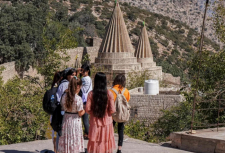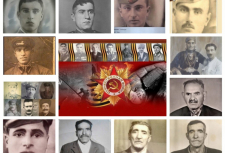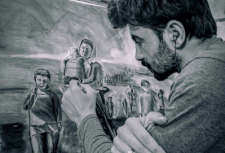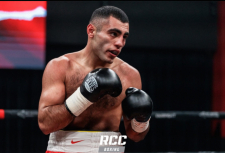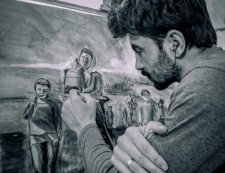Nadia Murad Explains The Blueprint To Help Religious Communities In Iraq
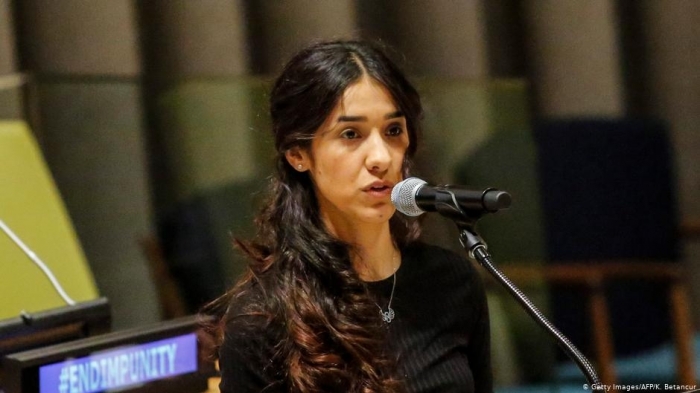
Several survivors of persecution based on religion or belief addressed the second Ministerial to Advance Religious Freedom on July 16-17, 2019. The event, hosted by Secretary of State Pompeo, provided a forum for victims to share their stories. Among them was a survivor of Daesh genocide and a tireless advocate for the Yazidi community, Nadia Murad.
Nadia Murad, who lost nine members of her family to the Daesh massacres, warned that we should not be fooled by stories that Daesh is largely defeated. The suffering of the communities targeted by Daesh is far from over. As Nadia explained, the consequences of the Daesh atrocities will be felt for generations: “My community and other religious minorities continue to feel the lasting effects of genocide. History and research have taught us time and time again that genocide is an ongoing process. Nearly 350,000 Yazidis are still stranded in IDP camps in Kurdistan. Over 3,000 Yazidi women and children remain missing.”
We know of the crimes committed by Daesh fighters towards communities in Syria and Iraq all too well. However, knowing what happened does not necessarily spark action to address the issues. Nadia emphasized that “while there is some support and empathy, there are no real efforts focused on the most important objective that would end the genocide and allow the Yazidis to heal – enabling my community to return to our ancestral homeland of Shingal and rebuild our lives in a safe, healthy environment.”
Nadia came prepared with a five-point action plan to address the challenges faced by her community in Iraq.
First, Nadia stressed the need to resolve the conflict over local governance in Shingal. “Disputes between Baghdad and Erbil over Shingal must end. Without a solution between them, Yazidis will continue to be the victims of their conflict.” Nadia repeated this concern when she met with President Trump.
Second, Nadia emphasized the need to focus on ensuring “long-term regional stability by investing in reconstruction and sustainable development initiatives.” She points out that funds are required to rebuild housing and basic infrastructure in the region. “Without international funding targeted to development in Shingal, stability cannot be achieved.”
Third, Nadia pointed out that Baghdad and Erbil must better integrate religious minorities into their Security Forces. “These efforts will enable religious minorities to have a hand in their own security and also prevent future genocidal efforts.” This is critical when considering how Yazidis were left alone unprotected before Daesh attacked.
Ezidi24.com
Tags: #yazidisinfo #yezidi #newsezidi
Nadia Murad Explains The Blueprint To Help Religious Communities In Iraq

Several survivors of persecution based on religion or belief addressed the second Ministerial to Advance Religious Freedom on July 16-17, 2019. The event, hosted by Secretary of State Pompeo, provided a forum for victims to share their stories. Among them was a survivor of Daesh genocide and a tireless advocate for the Yazidi community, Nadia Murad.
Nadia Murad, who lost nine members of her family to the Daesh massacres, warned that we should not be fooled by stories that Daesh is largely defeated. The suffering of the communities targeted by Daesh is far from over. As Nadia explained, the consequences of the Daesh atrocities will be felt for generations: “My community and other religious minorities continue to feel the lasting effects of genocide. History and research have taught us time and time again that genocide is an ongoing process. Nearly 350,000 Yazidis are still stranded in IDP camps in Kurdistan. Over 3,000 Yazidi women and children remain missing.”
We know of the crimes committed by Daesh fighters towards communities in Syria and Iraq all too well. However, knowing what happened does not necessarily spark action to address the issues. Nadia emphasized that “while there is some support and empathy, there are no real efforts focused on the most important objective that would end the genocide and allow the Yazidis to heal – enabling my community to return to our ancestral homeland of Shingal and rebuild our lives in a safe, healthy environment.”
Nadia came prepared with a five-point action plan to address the challenges faced by her community in Iraq.
First, Nadia stressed the need to resolve the conflict over local governance in Shingal. “Disputes between Baghdad and Erbil over Shingal must end. Without a solution between them, Yazidis will continue to be the victims of their conflict.” Nadia repeated this concern when she met with President Trump.
Second, Nadia emphasized the need to focus on ensuring “long-term regional stability by investing in reconstruction and sustainable development initiatives.” She points out that funds are required to rebuild housing and basic infrastructure in the region. “Without international funding targeted to development in Shingal, stability cannot be achieved.”
Third, Nadia pointed out that Baghdad and Erbil must better integrate religious minorities into their Security Forces. “These efforts will enable religious minorities to have a hand in their own security and also prevent future genocidal efforts.” This is critical when considering how Yazidis were left alone unprotected before Daesh attacked.
Ezidi24.com
Tags: #yazidisinfo #yezidi #newsezidi




